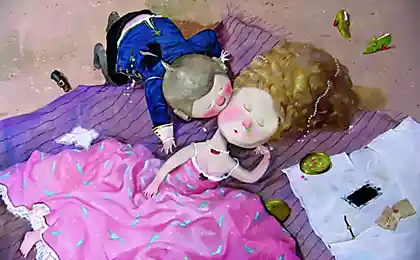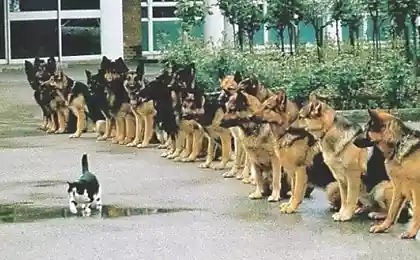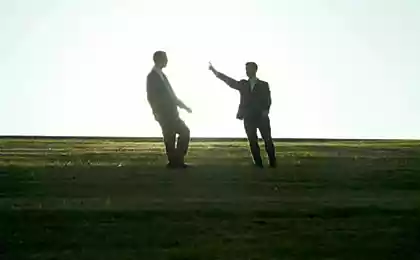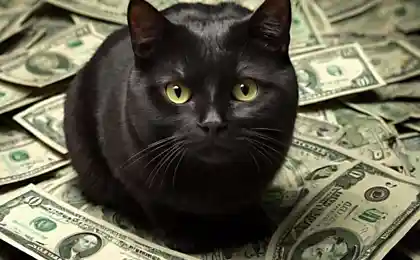810
Dispelling muses: 5 myths about creativity
Creativity have kazhdogoSegodnya creativity become a rare commodity in which you can earn. But is artistic career is only available to individual gifted people? Not at all. Many ideas about the elusive creative muse wrong.
In the journal General Music Journal in 1815 it published a letter in which Mozart describes his creative process as an instant: no fighting or creative crisis. Just comes a muse - and you're done!
And in fact, a letter - falsification.
Just like many other myths of creation, the mystical method described in the letter, only underscores the fallacy of our understanding of the works, if it is some magical power, one accessible and inaccessible to others.
We have created for ourselves a completely wrong way of creativity. Here are some myths that many of us still believe:
1. Creativity - is what you rozhdaetesKak often have you heard that creativity - is "something with which you are born?" They you either have it or they do not. But does this statement at least a grain of truth? Most modern textbooks on psychology recognizes that there are some cognitive aspects associated with the work that can be inherited, but few go so far as to suggest that there is a kind of creative casting, in which you can be born. Nevertheless myth maintained. This is partly because of the well-known artistic family, for example Vauh dynasty, which gave the world the three great writers of the 20th century (Arthur, Alex and Evelyn). Currently, we came to the conclusion that waiting for the children and the creative talents of famous people inherit their parents. But research shows that creativity is at all, but they just need to maintain and develop.
The creative process - a combination of all the parts of the brain, and not "the result of a certain magical part of the brain that does not occur in all people» h4> Jack Kerouac believed that "geniuses are born, and talents are, "and a nominee for the Nobel Prize author Edward de Bono said:" Creative thinking - is the ability, not just a matter of personal talent. Do not just sit on the bank of the river, listening to Baroque music and hope that inspiration will come. " "I think right brain! I am a creative person! "- You say. But this is contrary to modern neuroscience, which is now completely deny the existence of a single area of the brain responsible for creativity. They argue that the creative thinking activates all parts of our brain is composed of many interacting cognitive processes (both conscious and unconscious), as well as our emotions.
«Inspiration for amateurs, the others just work» h4> Harvard researcher and psychologist Shelley H. Carson says that these moments are the result of "incubation period," when the mind is distracted from current issues and freely creates a relationship which we do not normally carry. The phenomenon is called divergent thinking, and it is one of the components of the creative process.
The brain experienced writers (with a minimum of ten years experience) works more emotionally competent and ultimately more creative than with beginners h4> But creativity is taught worldwide. There is even an International Centre for the study of art at the State College Buffalo, New York-based owner of the network BBDO Alex Osborn, who belongs to the idea of "brainstorming"). Studies of the creative process by experienced masters and novices an opportunity to show your exercise "creative muscles».
In the journal General Music Journal in 1815 it published a letter in which Mozart describes his creative process as an instant: no fighting or creative crisis. Just comes a muse - and you're done!
And in fact, a letter - falsification.
Just like many other myths of creation, the mystical method described in the letter, only underscores the fallacy of our understanding of the works, if it is some magical power, one accessible and inaccessible to others.
We have created for ourselves a completely wrong way of creativity. Here are some myths that many of us still believe:
1. Creativity - is what you rozhdaetesKak often have you heard that creativity - is "something with which you are born?" They you either have it or they do not. But does this statement at least a grain of truth? Most modern textbooks on psychology recognizes that there are some cognitive aspects associated with the work that can be inherited, but few go so far as to suggest that there is a kind of creative casting, in which you can be born. Nevertheless myth maintained. This is partly because of the well-known artistic family, for example Vauh dynasty, which gave the world the three great writers of the 20th century (Arthur, Alex and Evelyn). Currently, we came to the conclusion that waiting for the children and the creative talents of famous people inherit their parents. But research shows that creativity is at all, but they just need to maintain and develop.
The creative process - a combination of all the parts of the brain, and not "the result of a certain magical part of the brain that does not occur in all people» h4> Jack Kerouac believed that "geniuses are born, and talents are, "and a nominee for the Nobel Prize author Edward de Bono said:" Creative thinking - is the ability, not just a matter of personal talent. Do not just sit on the bank of the river, listening to Baroque music and hope that inspiration will come. " "I think right brain! I am a creative person! "- You say. But this is contrary to modern neuroscience, which is now completely deny the existence of a single area of the brain responsible for creativity. They argue that the creative thinking activates all parts of our brain is composed of many interacting cognitive processes (both conscious and unconscious), as well as our emotions.
The creative process - a combination of all the parts of the brain, and not "the result of a certain magical part of the brain that does not occur in all people».
Creativity is not something that would wake up instantly, they come slowly. The belief that they are born, negates all the hard work, effort and time required to create anything of value.
Are you afraid of hard work? James Dyson is known for five years has created 5,000 prototypes of his vacuum before you finalize it. But Walt Disney was fired from his job in the Kansas City Star, because the editor felt that "he lacked imagination and good ideas».

2. You can not control the moment comes vdohnovenieOdin of the biggest myths about the creative process - is that you can not call an inspiration at the right time. Muse comes when it is ready, and to influence it in any way you can not.
Some of my best ideas come when I'm in the shower, surrounded by dark tiles and white porcelain, away from anything that might affect my thoughts. But research shows that these moments of sudden inspiration and insight are in fact only the culmination of the previous hard work of our brain.
«Inspiration for amateurs, the others just work» h4> Harvard researcher and psychologist Shelley H. Carson says that these moments are the result of "incubation period," when the mind is distracted from current issues and freely creates a relationship which we do not normally carry. The phenomenon is called divergent thinking, and it is one of the components of the creative process.
So in a moment of "Eureka!" There is nothing so special. It's just a culmination of hard work and previous thoughts rather than passively waiting for the arrival of inspiration.
There is a famous story of a Hungarian professor of psychology, who asked 275 creative people to give him an interview for a book he wrote. A third of them said 'no' because of the lack of time (even one-third did not answer, which may also mean that they did not have time).
Animator of Looney Toons (Funny ringtones) Chuck Jones argued that the need to make 100,000 bad drawings before you get good. A legendary fotorealist Chuck Close is known for his phrase "Inspiration for amateurs, the others just work».
Again and again the famous people of creative professions argue that the work - this is the key to creative success. In fact, in a study conducted by psychologist Carol Dweck ctenfordskim (Carol Dweck), 143 creative workers agreed that the number one quality that underlies the creative success is persistence and perseverance. Kevin Ashton (Kevin Ashton) wrote in his book «How to Fly a Horse» («How to make a horse fly"): "Time - is the raw material for creation. Drop the magic and myths of creation, and will only work: work to gain experience through study and practice, to find solutions to problems, working by trial and error, reflection and improvement of work ».
3. You can not learn to be creative lichnostyuFraza "No one can teach you to be a creative person" - just another myth, and a favorite excuse when dismissal from art schools around the world. All this adds creativity is something mystical that makes it a kind of unearthly quality, inaccessible to ordinary people.
The brain experienced writers (with a minimum of ten years experience) works more emotionally competent and ultimately more creative than with beginners h4> But creativity is taught worldwide. There is even an International Centre for the study of art at the State College Buffalo, New York-based owner of the network BBDO Alex Osborn, who belongs to the idea of "brainstorming"). Studies of the creative process by experienced masters and novices an opportunity to show your exercise "creative muscles».
A recent study showed that the brains of experienced writers (with a minimum of ten years experience) works more emotionally competent and ultimately more creative compared to novices.
The study involved two groups: beginners and experienced. Connected to the reading brain waves device, they read the beginning of the story, thought it would go on, and then two minutes recorded continued. The frontal lobe of the brain, where our brain deals with motivation, planning, and attention (among other things), brain experts showed greater activity. Not only are they able to understand the language, but also focus more on the emotional subtext and more abstract ideas - a standard component of creativity. As Alex Fraser of the British Psychological Society, "Ideas are beginning to seethe in them are on the way from concept to expression of thought».
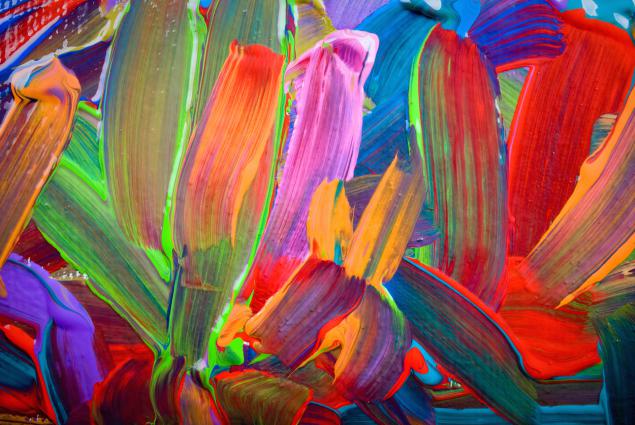
4. Creativity is born in isolation (the myth of the solitary creator) I have a mental image of my mythical creation - my creative "totem animal." Totem animal sits at a small wooden table, lamp illuminates only a pen and notebook in his left hand he holds a tumbler of whiskey. No wonder that he is one. The mental image of a lone creator, toiling all night, have become archetypal. We have a tendency to rewrite history and is credited with creating only one person, but in fact it was hard work and collaborative efforts of the creative team.
The company Pixar, where artists create new characters, they are all sitting at the table, drawing their ideas and spread them in the middle of the table. All the fun discussing each other's work, leveraging the creativity and imagination of other people to create their own ideas.
David Bёrkus, author of "Myths of Creativity: The truth about how innovative companies and people generate great ideas," stands for "creative support group," citing the example of the famous circle of writers "Inklings", which consisted of such British writers like J. . R. R. Tolkien, CS Lewis, Charles Williams, and others. They met in an informal atmosphere in the pub or at home from each other to discuss new trends, show the manuscript and generally just draw strength from each other. At one of these meetings, CS Lewis, Tolkien even argued with the manuscript, which he read at the next meeting, was strong enough to publish (a little thing called "The Lord of the Rings." You probably heard of it.
5. Creativity is given to those who have the time and opportunity to the Middle Ages work was only possible for those who have been divinely inspired (the rest were fighting with dragons raided the village or plowed land, trying to survive). However, in the Renaissance, people finally started thinking about the ability to create beautiful masterpieces. But they had to be great people - I think, like Leonardo, Michelangelo and Botticelli. In the 19-20 centuries. Creativity was the fact that the department is born with wealth and status of those who are the first "self-made success." Throughout the history of creativity and creation have been a line in the sand, separating the classes and types. But what it is born the idea, based on these examples? Creativity is intended for those who have the time and means to deal with them. However, the current study showed that creative thinking is most likely formed in the presence of constraints. Investigation Department of Social Psychology, University of Amsterdam found that when people are faced with constraints, it forces them to step back and look at the big picture and to carry out communication between things that they normally would not do - this is the ability called "global processing" which is the hallmark of creative people. Even people like architect Frank Gehry and inventor Max Shepherd was named the number one limiting factor affecting the development of creative thinking.
Not convinced? Here's another example. In the book "Green Eggs and Ham" by Dr. Seuss, which has sold more than 200 million copies, using only 50 different words, it was part of a bet, the author concluded with the founder of the publishing house Random House and Bennett Cerf. Easy to hide your work away because you think you are not good enough. Even easier to postpone the establishment, because "you are not creative people," or "you just do not feel the inspiration." But the truth is that, like everything else in life, creativity - this is something that should be developed and strengthened through practice. Andy Warhol put it more precisely all when asked: "Why do people think artists are special? It's just another job ».
Whether you're a writer, sculptor, designer, or play on the banjo, moving forward, to remain open, ask for help and do not be obsessed with the tool who are in your possession. Ultimately, this will make you a better creator.
via lifehacker.com/demystifying-the-muse-five-creativity-myths-you-should-1688503554
Three important lessons of married life
Dogs - the most sarcastic creatures in the animal kingdom, and 3 more curious fact





